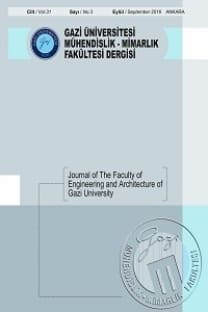Çok gruplu sınıflandırma problemlerine regresyon analizi ve matematiksel programlama tabanlı yeni bir yaklaşım
Bu
çalışmada, çok gruplu sınıflandırma problemlerinin çözümü için regresyon
analizi ve matematiksel programlamaya dayalı iki aşamalı yeni bir hibrit
sınıflandırma yöntemi geliştirilmiştir. Önerilen yöntemin ilk aşamasında, her
bir birimin sınıflandırma skoru her birim için oluşturulan doğrusal regresyon
denklemi yardımıyla tahmin edilmektedir. İkinci aşamasında ise, birimlerin
sınıflandırılması kümeleme analizi tabanlı matematiksel programlama modeli ile
yapılmaktadır. Önerilen yöntem kendisini oluşturan regresyon analizi ve
matematiksel programlama yöntemlerinin güçlü yanlarını kombine etmektedir.
Literatürden alınan 10 gerçek veri seti ve simülasyon çalışması sonuçlarından,
önerilen yöntemin regresyon analizi, matematiksel programlama ve yapay sinir
ağı temelli sınıflandırma yöntemlerine göre daha iyi performans gösterdiği
gözlemlenmiştir.
Anahtar Kelimeler:
Sınıflandırma problem, matematiksel programlama, regresyon analizi, iki aşamalı yaklaşım
___
- 1. Silva, A.P.D., Optimization approaches to Supervised Classification, European Journal of Operational Research, 261, 772–788, 2017.
- 2. Mahmoudi, N, Duman, E., Detecting credit card fraud by Modified Fisher Discriminant Analysis, Expert Systems with Applications, 42, 2510–2516, 2015.
- 3. Yagi, T., Takahashi, M., Business cycle turning points based on DEA discriminant analysis, Applied Economics, 48 (44), 4251-4256, 2016.
- 4. Takcı, H., Centroid Sınıflayıcılar Yardımıyla Meme Kanseri Teşhisi, Journal of the Faculty of Engineering and Architecture of Gazi University, 31(2), 323-330, 2016.
- 5. Benmalek, E., Elmhamdi, J., Jilbab, A. Multiclass classification of Parkinson’s disease using different classifiers and LLBFS feature selection algorithm. International Journal of Speech Technology, 20 (1), 179–184, 2017.
- 6. Yabanova, İ., Yumurtacı, M., Classification of dynamic egg weight using support vector machine, Journal of the Faculty of Engineering and Architecture of Gazi University, 33 (2), 393-402, 2018.
- 7. Jing, Z., Wang, G., Zhang, S., Qiu, C., Building Tianjin driving cycle based on linear discriminant analysis, Transportation Research Part D, 53, 78–87, 2017.
- 8. Wilson, S.R., Close, M.E., Abraham, B., Applying linear discriminant analysis to predict groundwater redox conditions conducive to denitrification, Journal of Hydrology, 556, 611–624, 2018.
- 9. Chen, L., Wang, E.Y., Feng, J.J., Wang, X.R., Li, X.L., Hazard prediction of coal and gas outburst based on Fisher discriminant analysis, Geomechanics and Engıneering, 13 (5), 861-879, 2017.
- 10. Fisher, R., The use of multiple measurements in taxonomic problems, Annals of Eugenics, 7 (2), 179-188, 1936.
- 11. Lachenburch P.A., Discriminant analysis, Hafner Press, New York, USA, 40-90, 1975.
- 12. Anderson, T.W., An introduction to multivariate analysis, Wiley, New York, USA, 10-25, 1984.
- 13. Fred, N., Glover, F., A Linear programming approach to the discriminant problem, Decision Sciences, 12, 68-74, 1981.
- 14. Fred, N., Glover, F., Simple but powerful goal programming formulations for the statistical discriminant problem, European Journal of Operational Research, 7, 44-60, 1981.
- 15. Lam, K.F., Choo, E.U., Moy, J.W., Minimizing deviations from the group mean: A new linear programming approach for the two-group classification problem, European Journal of Operational Research, 88, 358-367, 1996.
- 16. Sueyoshi, T., DEA-Discriminant analysis in the view of goal programming, European Journal of Operational Research, 115, 564-582, 1999.
- 17. Sueyoshi, T., Mixed integer programming approach of extended DEA-Discriminant analysis, European Journal of Operational Research, 152, 45-55, 2004.
- 18. Sueyoshi, T., DEA-Discriminant analysis: Methodological comparison among eight discriminant analysis approaches, European Journal of Operational Research, 169, 247-272, 2006.
- 19. Bal, H., Örkcü, H.H., Çelebioğlu S., “An alternative model to Fisher and linear programming approaches in two-group classification problem: minimizing deviations from the group median”, G.U. Journal of Science, 19 (1), 49-55, 2006.
- 20. Ramanan, A., Suppharangsan, S.,Niranjan, M. Unbalanced decision trees for multi-class classification. In Industrial and information systems, 2007, 291-294, ICIIS 2007.
- ISSN: 1300-1884
- Yayın Aralığı: Yılda 4 Sayı
- Başlangıç: 1986
- Yayıncı: Oğuzhan YILMAZ
Sayıdaki Diğer Makaleler
Akıllı darbe gerilimi ölçümleyicinin tasarımı ve gerçeklenmesi
Fındık kabukları ile farklı model boyaların gideriminin kinetik ve termodinamik incelemesi
Yardım malzemesi dağıtım operasyonlarının simülasyon ile analizi
Muammer TÜRKOĞLU, Davut HANBAY
Sensör işaretlerinden cinsiyet tanıma için yerel ikili örüntüler tabanlı yeni yaklaşımlar
Fatma KUNCAN, Yılmaz KAYA, Melih KUNCAN
Nahit YILMAZ, Cevriye TEMEL GENCER
NaX Nano-taneciklerin ağır metal ve boyar maddelere karşı adsorpsiyon kapasitelerinin belirlenmesi
Nöromüsküler hastalıkların yapay zeka yöntemleri ile sınıflandırılması
Hanife KÜÇÜK, İlyas EMİNOĞLU, Kemal BALCI
Yersel lazer tarama verisi ile elde edilen 3B modellerde filtreleme etkisinin araştırılması
